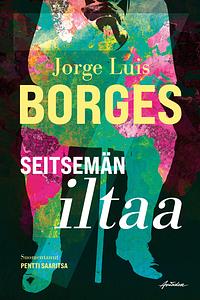Take a photo of a barcode or cover
rare flashes of originality in the midst of boredom; the essay on Kabbalah was completely wonderful
medium-paced
A collection of translated essays originally delievered as public lectures in the 70's. This is an all time favorite that I find myself picking up at least once a year.
If the written word was to disappear without a trace, I could probably recite the essay on The Divine Comedy from memory.
"There is something that Dante does not say, but which one feels at a distance from the episode and perhaps gives it its virtue. Dante relates the fate of the two lovers with an infinite pity, and we sense that he envies their fate. Paolo and Francesca are in Hell and he will be saved, but they have loved and he never won the love of the woman he loved, Beatrice. There is a certain injustice to this, and Dante must feel it as something terrible, now that he is separated from her. In contrast, these two sinners are together. They cannot speak to each other, they turn in the black whirlwind without hope, yet they are together. When she speaks, she says “we,” speaking for the two of them, another form of being together. They are together for eternity; they share Hell and that,― for Dante, must have been a kind of Paradise."
If the written word was to disappear without a trace, I could probably recite the essay on The Divine Comedy from memory.
"There is something that Dante does not say, but which one feels at a distance from the episode and perhaps gives it its virtue. Dante relates the fate of the two lovers with an infinite pity, and we sense that he envies their fate. Paolo and Francesca are in Hell and he will be saved, but they have loved and he never won the love of the woman he loved, Beatrice. There is a certain injustice to this, and Dante must feel it as something terrible, now that he is separated from her. In contrast, these two sinners are together. They cannot speak to each other, they turn in the black whirlwind without hope, yet they are together. When she speaks, she says “we,” speaking for the two of them, another form of being together. They are together for eternity; they share Hell and that,― for Dante, must have been a kind of Paradise."
Emerson said that a library is a magic chamber in which there are many enchanted spirits. They wake when we call them. When the book lies unopened, it is literally, geometrically, a volume, a thing among things. When we open it, when the book surrenders itself to its reader, the aesthetic event occurs. And even for the same reader the same book changes, for the change; we are the river of Heraclitus, who said that the man of yesterday is not the man of today, who will not be the man of tomorrow. We change incessantly, and each reading of a book, each rereading, each memory of that rereading, reinvents the text.
This is a series of seven lectures Borges delivered in the late 70s, relying on his capacious memory as his eyesight had departed by this time. The final lecture on Blindness explores this dynamic, citing Oscar Wilde's assertion that Homer had to be mythologized as a blind poet to present poetry as an aural art.
There are sidelong digressions on The Arabian Nights, on Dante. Etymology is explored. It is a telling endorsement of Borges that I was transfixed by his pontificating on Buddhism, a subject I can't imagine contemplating otherwise. The Maestro recognizes human failing without wasting time to illustrate such. His remark that being blind afforded him the opportunity to explore medieval literature, especially Old English and the Scandinavian Ruins. This revelation is most profound.
This is a series of seven lectures Borges delivered in the late 70s, relying on his capacious memory as his eyesight had departed by this time. The final lecture on Blindness explores this dynamic, citing Oscar Wilde's assertion that Homer had to be mythologized as a blind poet to present poetry as an aural art.
There are sidelong digressions on The Arabian Nights, on Dante. Etymology is explored. It is a telling endorsement of Borges that I was transfixed by his pontificating on Buddhism, a subject I can't imagine contemplating otherwise. The Maestro recognizes human failing without wasting time to illustrate such. His remark that being blind afforded him the opportunity to explore medieval literature, especially Old English and the Scandinavian Ruins. This revelation is most profound.
Seven lectures on The Divine Comedy, Nightmares, Thousand and One Nights, Buddhism, Poetry, The Kabbalah and Blindness. Fantastic!
Interesting little essays. I didn't find these as interesting as his short stories, but they did give me some things to think about.
Beautiful, fascinating series of lectures from the erudite Borges. The seven lectures in this collection were transcribed from recordings in the seventies and engage such diverse topics as Dante, blindness, nightmares and Buddhism in the way that only Borges could. This book, like all Borges offerings, is a great pleasure.
‘I have tried to disregard as much as possible the history of literature. When my students asked me for a bibliography, I told them, "A bibliography is unimportant-after all, Shakespeare knew nothing of Shakespearean criticism. Why not study the texts directly? If you like the book, fine; if you don't, don't read it. The idea of compulsory reading is absurd; it's only worthwhile to speak of compulsory happiness. I believe that poetry is something one feels. If you don't feel poetry, if you have no sense of beauty, if a story doesn't make you want to know what happened next, then the author has not written for you. Put it aside. Literature is rich enough to offer you some other author worthy of your attention-or one today unworthy of your attention whom you will read tomorrow.”’
-
What a (mostly) fun time. Can’t wait to get better at Spanish and read more of his work in its native language!!!
-
What a (mostly) fun time. Can’t wait to get better at Spanish and read more of his work in its native language!!!
چیزی در این میان وجود دارد که دانته نمیگوید، اما آدمی آنرا به گونهای غیرمستقیم احساس میکند و شاید حُسن این قسمت نیز در همین باشد. دانته سرنوشت دو دلداده را با رقتی بیپایان روایت میکند، و ما احساس میکنیم که بر سرنوشت آن دو رشک میبرد. پائولو و فرانچسکا در دوزخاند و دانته رستگاری خواهد یافت، اما آن دو به هم عشق ورزیدهاند در حالیکه او هرگز به عشق زنی که دوست میداشت نائل نشد. بیعدالتی مسلمی در میان است، و دانته، اکنون که در فراق او به سر میبرد، لابد بطور آزاردهندهای آنرا احساس میکند. برعکس او، این دو گنهکار به وصال یکدیگر رسیدهاند. آن دو نمیتوانند با یکدیگر سخن بگویند، درون گردباد سیاه، بیاُمید میچرخند، اما با این همه با یکدیگرند. هنگامی که فرانچسکا سخن میگوید، از ضمیر «ما» استفاده میکند و از جانب هر دویشان سخن میگوید، و این شکل دیگری از با هم بودن است. آن دو تا ابد با یکدیگرند، عذاب دوزخ را مشترکاً تحمل میکنند - واین، از نظر دانته، میبایست نوعی بهشت بوده باشد
از سخنرانی شب اول دربارهٔ «کمدی الهی»، صفحههای ۲۴ و ۲۵، ویرایش اول ۱۳۷۸، برگردان بهرام فرهنگ
از سخنرانی شب اول دربارهٔ «کمدی الهی»، صفحههای ۲۴ و ۲۵، ویرایش اول ۱۳۷۸، برگردان بهرام فرهنگ
Borges reveals the world to you, his way of thinking and seeing wrestle with you, trick you. the transcription and translation of these speeches are amazing, it reads as dialogue more than didacticism. the essays on poetry, kabbalah and buddhism were particularly amazing
emotional
informative
inspiring
reflective
medium-paced



